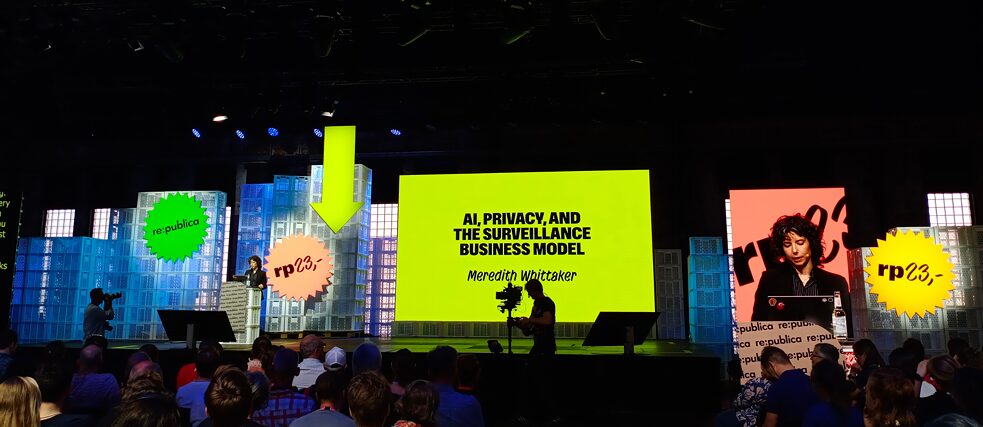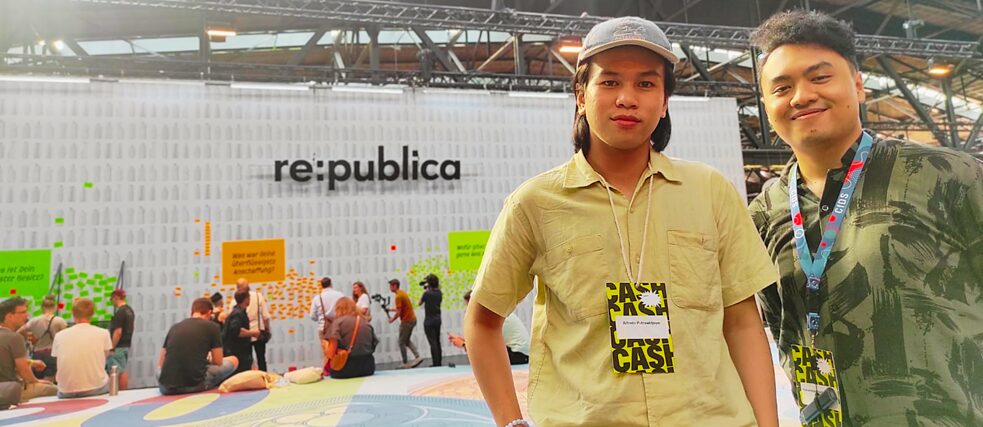Re:publica 2023 in Berlin
On the Affordances of Technology

Next to the river Spree in Kreuzberg, Berlin, thousands of like-minded individuals congregated in Europe’s largest conference on digital culture and digital society “re:publica 2023” (rp23). The similarity of values among the attendees was displayed during the first day's keynote given by the President of Signal Foundation Meredith Whittaker. She took the stage to lament against the worldwide breaches of privacy and the surveillance business model. When Meredith disclosed that she is also there to promote Signal, she remarked, “You are all probably already using Signal,” to an audience agreeing in consent.
Beside observing many like-minded conference participants with an academic background like us, there was an eclectic bunch, as this years' motto was “CASH”. The organisers want to “follow the money” and talk about the “costs of solutions” to issues linked to the world’s richest, but presenters and panelists have interpreted it differently. This means money and the financial systems are not the only topics on the table. There were a wide range of sessions we can choose, from impactful journalism to climate change to new work.
In addition, the conference is more than a collection of speeches. It is also a festival. Re:publica also wants people to have fun. There are interactive workshops, retro game consoles, and even a pool the attendees could enjoy across the event's three days (5th–7th June 2023).
Everything watched over by machines?
Re:publica 2023 was exciting for us, with speakers, makers, and listeners engaging in lively sessions discussing wide topics from human excretion to the regulation of artificial intelligence. In particular, the affordance of technology was a dominant theme. In other words, how technology’s design and implementation can be utilised for good or for bad intentions. This had not only technical, but also political implications.For instance, the familiar voice of Paris Marx, host of the Tech Won’t Save Us podcast, spoke of how technology companies frequently fail to deliver on their promises to solve social issues. He highlighted the case of Uber and how the company posits a social issue (transportation) as a technical problem. Marx also made the point that this viewpoint is an ideology that is prevalent in Silicon Valley. In fact, Marx also pointed out that the fake futurism that is sold by companies like the Hyperloop are intended to disrupt public transportation infrastructure such as the California high-speed rail system. Seeing Marx on stage after months of listening to his voice was very interesting as we have been avid listeners of his podcast. We highly recommend it for those that love a deeper and more critical analysis of the tech industry!
Transportation systems are only one example of themes where this ideology that maintains technology as the answer to societal issues extends its hand. Sarah Spiekerman from Vienna University of Economics and Business lays out the details of this twisted kind of transhumanism, where people are reduced and where the potential of technology is overpromised. A transhumanism that Susan Levin, the Roe/Straut Professor in the Humanities and Professor of Philosophy at Smith College Northampton, Massachusetts, USA, argues has roots in the Anglo-American eugenics movements. This ideology is believed by some of the most powerful and richest individuals in the world, such as Peter Thiel, a German-American billionaire entrepreneur and co-founder of PayPal, who backed Donald Trump’s 2016 presidential campaign.
Some answers that may seem simple and claim to “solve” problems are more than meets the eye. More often than not, they only fulfil the utopian visions of the future for tech billionaires rather than the general public.
There is an alternative
I have the impression that everyone at rp23 seemingly realised the pervasiveness of technology in questions of inequality and the inquiry of convenience and ethics. Attendees understood that there is indeed a problem in the current state of things, and we hope that some answers or alternatives were thought of in the Arena Berlin while making friends along the way.Cory Doctorow, Canadian science-fiction author, activist, and journalist, and the Australian Professor Rebecca Giblin from Melbourne Law School observed that there is a movement brewing in fighting corporate power. In addition, Doctorow and Giblin also urged workers and consumers across ostensibly disparate sectors to realise their commonality. To compound this alliance, they suggested that we need to create “ideas lying around” waiting for the moment in crises where “ideas can travel from the periphery to the centre in the blink of an eye.”
Mark Graham from the Oxford Internet Institute, a department of Oxford University in the United Kingdom, Esther Gathigi-Kibugi from the social enterprise Digital Opportunity Trust Kenya, and Germany’s Minister for Economic Cooperation and Development Svenja Schulze spoke during a panel discussion about platform work, which is the best example of how advocacy-oriented research, regulators, and affinity groups can collaborate. The panellists highlighted two intersecting issues, decent work and gender inequality. Esther highlighted why platform work or “gig economy” business models were thriving in Kenya. It provided people with a myriad of job opportunities within the flexibility of their own time. Esther also explained that this kind of work flexibility has great potential for women in particular. Women still tend to be mainly responsible for taking care of children and the home, which makes it much harder for them to fit into the traditional labour market. Despite the positive opportunities, the gig economy pays relatively low wages compared to other business sectors.
To address these issues, the Oxford Internet Institute and the German Federal Ministry for Economic Cooperation and Development developed the “Fairwork Project”. The “Fairwork Project”, according to Graham, is in principle a project that highlights the best and worst examples of how new technologies are being used in the workplace through a series of ratings. Much like how platform economy workers rely on the rating system, the “Fairwork Project” does so to the platforms themselves with the fairwork rating. The project aims to ensure that the future of work is made of better and fairer jobs. Regarding how platforms responded to the ratings, Graham highlighted that the “Fairwork Project” will discuss these with the platforms first, reveal their scores, and give them time to adjust. Graham argues that this method would pressure the platforms to better themselves, as no platform would willingly want to be ranked low. This session was particularly personal as we were involved in the “Fairwork Project” for Indonesia. Seeing the fruits of our labour realized into something impactful for gig workers has cemented to us the importance of our work and that it, too, can positively impact others.
More than meets the eye
 Alfredo and Karim posing in front of the republica wall. | © Alfredo Putrawidjoyo and Perdana Karim
Alfredo and Karim posing in front of the republica wall. | © Alfredo Putrawidjoyo and Perdana Karim
If we had to describe the three days, we would say “eye-opening”. Our preconceived notions regarding re:publica was that it was simply just another conference. However, whatever expectations we had previously were immediately shattered when we entered the venue. It was indeed an experience. There were so many activities to enjoy, so that we had to sacrifice some panels and sessions we wanted to attend. But we can say for sure that we did not regret the ones that we chose. If you enjoy engaging in tech-savvy discussions, fruitful activities, and being surrounded by like-minded individuals from around the world, look no further than to Re:publica 2024.